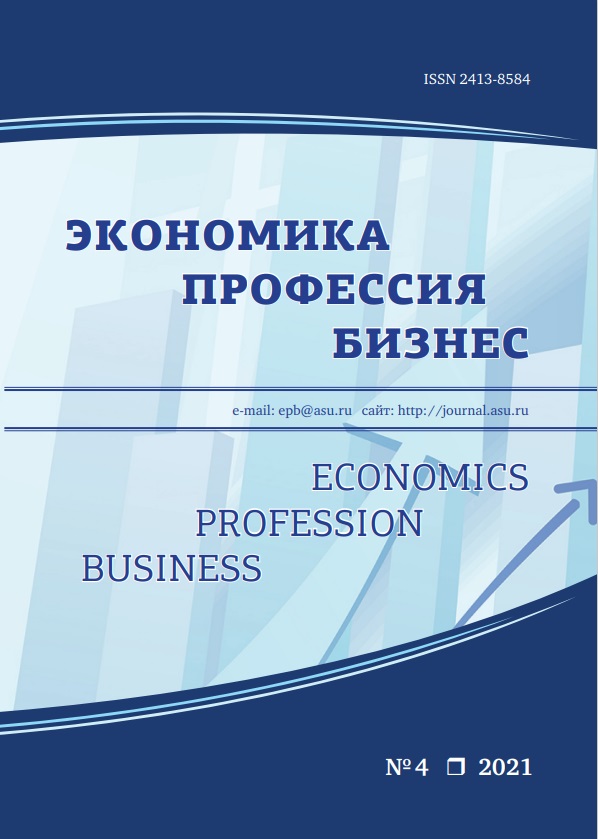PROBLEMS OF DEVELOPMENT OF THE ENERGY INDUSTRY IN THE ARCTIC TERRITORIES
УДК 338.45:621.31
Abstract
The electric power industry is a branch of energy that includes the production, transmission and subsequent sale of electricity. Generating companies do not sell electricity directly to the population, but produce electricity and supply it to the wholesale market, where it is bought by sales companies, guaranteeing suppliers, independent energy marketing companies and large industrial consumers. Based on the results of a comparative analysis of the financial activities of energy marketing enterprises of the Russian Federation, problems are identified, imbalances and strategic plans for their development are determined. The results showed that the development of the energy industry as a whole depends on the financial activities of guaranteeing electricity suppliers. Unlike an independent power supply company, the activity of guaranteeing suppliers is less profitable and low-profitable, and the financial condition, in turn, is characterized by low solvency and financial stability. The authors have identified the weaknesses and strengths of this development. It is noted that the weakest side is the violation of the repayment terms of funds in settlements by electricity consumers, which leads to the formation of a negative financial result. The identified problems of financial development allow production us to form direction.
Downloads
Metrics
References
Бабкина Л. Н., Скотаренко О. В. Применение квалиметрического подхода в управлении региональной экономикой // Научно-технические ведомости Санкт-Петербургского государственного политехнического университета. Экономические науки. 2013. № 4 (175). С. 45-52.
Скотаренко О. В., Бабкина Л. Н. Особенности квалиметрического подхода в региональных исследованиях // Научно-технические ведомости Санкт-Петербургского государственного политехнического университета. Экономические науки. 2013. № 5 (180). С. 161-165.
О Стратегии развития Арктической зоны Российской Федерации и обеспечения национальной безопасности на период до 2035 года: Указ Президента РФ от 26 октября 2020 г. № 645. URL: http: www.pravo.gov.ru.
Социально-экономическое развитие Арктической зоны Российской Федерации. Постановление Правительства РФ от 30.03.2021 № 484. URL: http: www.pravo.gov.ru.
Энергетическая стратегия России на период до 2030 года. Распоряжение Правительства РФ от 13 ноября 2009 г. № 1715-р. URL: http: www.pravo.gov.ru.
Страны и регионы. Статистический справочник Всемирного банка. Официальный сайт группы Всемирного банка. URL: https://www5.worldbank.org/eca/russian/data/.
Большаков Б. Е., Шамаева Е. Ф., Шевенина Е. В. Сетевая модель проектного управления устойчивым инновационным развитием региона и предприятия с использованием естественнонаучных измерителей. Формализация задач // Наука Красноярья. 2014. № 2. С. 40-78.
Владимирская Д. А., Кутепова М. В., Плотников В. А. Специфика развития предпринимательства в Арктической зоне Российской Федерации // Экономика и управление. 2018. № 9 (155). С. 16-23.
Змиева К. А. Проблемы энергоснабжения арктических регионов // Российская Арктика. 2020. № 8. С. 5-14.
Скуфьина Т. П., Бажутова Е. А., Самарина В. П. Предпринимательская активность в регионах российской Арктики в сравнении с общероссийской ситуацией // Арктика и Север. 2019. № 37. С. 51-68.
Регионы России. Социально-экономические показатели — 2019 г. Официальный сайт Федеральной службы государственной статистики. URL: https://gks.ru/bgd/regl/b19_14p/Main.htm.
REFERENCES
Babkina L. N., Skotarenko O. V. Application of the qualimetric approach in the management of the regional economy // Scientific and technical statements of the St. Petersburg State Polytechnic University. Economic sciences. 2013. No. 4 (175). Pp. 45-52.
Skotarenko O. V., Babkina L. N. Features of the qualimetric approach in regional studies // Scientific and technical statements of the St. Petersburg State Polytechnic University. Economic sciences. 2013. No. 5 (180). Pp. 161-165.
Strategy for Developing the Russian Arctic Zone and Ensuring National Security until 2035. Executive Order of the Russian President of 26 October 2020 No 645. URL: http: www.pravo.gov.ru.
Socioeconomic Development of the Russian Arctic Zone. Russian Government Decree of 30.03.2021. No. 484. URL: http: www.pravo.gov.ru.
Energy Strategy of Russia until 2030. Russian Government Instruction of 13 November 2009. No 1715-r. URL: http: www.pravo.gov.ru.
Countries and regions. World Bank Statistical Handbook. The official website of the World Bank Group. URL: https://www5.worldbank.org/eca/russian/data/.
Bolshakov B. E., Shamaeva E. F., Shevenina E. V. A network model of project management for sustainable innovative development of a region and an enterprise using natural science meters. Formalization of tasks // Science of Krasnoyarsk. 2014. No. 2. Pp. 40-78.
Vladimirskaya D. A., Kutepova M. V., Plotnikov V. A. Specifics of business development in the Arctic Zone of the Russian Federation // Economy and Governance. 2018. No. 9 (155). Рp. 16-23.
Zmieva K. A. Problems of energy supply in Arctic regions // Russian Arctic. 2020. No. 8. Рp. 5-14.
Skufyina T. P., Bazhutova E. A., V. P. Samarina. Bussiness activities in Russian Arctic regions compared with the general situation in Russia // The Arctic and the North. 2019. No. 37. Рp. 51-68.
Regions of Russia. Socioeconomic indicators — 2019. Official website of the Russian Federal State Statistics Service URL: https://rosstat.gov.ru/folder/210/document/13204.
Economics Profession Business is a golden publisher, as we allow self-archiving, but most importantly we are fully transparent about your rights.
Authors may present and discuss their findings ahead of publication: at biological or scientific conferences, on preprint servers, in public databases, and in blogs, wikis, tweets, and other informal communication channels.
Economics Profession Business (EPB) allows authors to deposit manuscripts (currently under review or those for intended submission to EPB) in non-commercial, pre-print servers such as ArXiv.
Authors who publish with this journal agree to the following terms:
- Authors retain copyright and grant the journal right of first publication with the work simultaneously licensed under a Creative Commons Attribution License that allows others to share the work with an acknowledgement of the work's authorship and initial publication in this journal.
- Authors are able to enter into separate, additional contractual arrangements for the non-exclusive distribution of the journal's published version of the work (e.g., post it to an institutional repository or publish it in a book), with an acknowledgement of its initial publication in this journal.
- Authors are permitted and encouraged to post their work online (e.g., in institutional repositories or on their website) prior to and during the submission process, as it can lead to productive exchanges, as well as earlier and greater citation of published work (See The Effect of Open Access).









